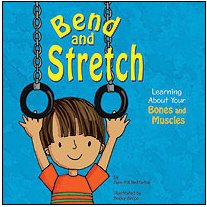Do you know what the largest muscle in the human body is? How about the strongest?
The kids thought it was hilarious that the largest muscle is the gluteus maximus (your butt) and were very surprised to learn that the strongest is in your tongue.
We started our study of the muscular system by watching The Magic School Bus Flexes It’s Muscles, and reading from our various encyclopedias and Bend and Stretch: Learning about Bones and Muscles.

After discussing what we read, I had the kids try and hold completely still – using no muscles at all.
George thought it was super hard and Vicki said her finger kept twitching. We then talked about how even if they held perfectly still, there were still muscles in their body working. The involuntary muscles that controlled the heart beating, breathing, blinking and swallowing worked all the time without us thinking about it.
We flexed our arms and felt the movement of our biceps and triceps muscles, and discussed how muscles worked in pairs since muscles only pulled and relaxed, but never pushed.
We used paper towel tubes, and rubber bands to make a model of an arm and show how muscles pull to make your arm bend (from Evan Moor).
We looked at a picture of a muscle cell that Steph sent us. She took it while while using the microscope in her Human Anatomy class in college. George thought it looked like Mars.
We then went to the computer and the kids watched a very short video at Kids Biology. com and a much more comprehensive one at Kids Health .org.
George tried the Muscle Hustle game at Science World.ca but it was pretty hard to get the hang of it. That led to a discussion of “no wonder it’s so hard for babies to learn to walk” since they have to coordinate all the muscles.
George finished up by writing some muscle facts in his research notebook:
-There are over 600 muscles in the body.
-There are 3 types of muscles: smooth, cardiac and skeletal
-Muscles pull but don’t push
Next will be the Circulatory System.




No comments:
Post a Comment